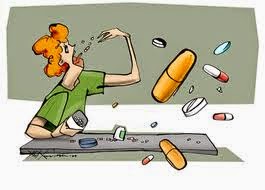Det er en stund siden jeg har skrevet noe, mest fordi det ikke lenger skjer noe nytt. Det er den samme rutinen hver dag; stå opp, spise et par brødskiver og et batteri med piller, kjøre til sykehuset, bli bestrålt i ca tre minutter, på med buksa og kjøre hjem igjen. Om jeg merker noe resultat av all denne cellegiften og bestrålingen? Foreløpig ingen ting, kun bivirkningene. Så jeg får vel bare fortsette å vente i spenning. I mellomtiden kan jo de som har lyst, lese nedenstående artikkel, skrevet av Kate Granger publisert i The Guardians nettavis theguardian.com fredag 25.april 2014. Ikke nødvendigvis mine ord, men leseverdig likevel.
Why is military language used to describe cancer? These words are meant to help patients but can have the opposite effect

'In my world, having
cancer is not a fight at all … Some days cancer has the upper hand,
other days I do.' Photograph: Sportsphoto Ltd/Allstar
"She lost her brave fight." If anyone mutters those words after my death, wherever I am, I will curse them. I would like to be remembered for the positive impact I have made on the world, for fun times and for my relationships with others, not as a loser. When I do die, I will have defied the prognosis for my type of cancer and achieved a great deal with my life. I do not want to feel a failure about something beyond my control. I refuse to believe my death will be because I didn't battle hard enough.
And that's the problem; in my view the language used around cancer seems to revolve around wartime rhetoric: battle, fight, warrior, beat. While I recognise that these violent words may help others on their journey with cancer, as someone who is never going to "win her battle" with this disease, I find them uncomfortable and frustrating to hear.
However, I do understand why this military language has penetrated the media, charities and everyday life. It is meant to evoke positivity at an unimaginably difficult time in someone's life. But I think it can have the opposite effect and we need to challenge it and to break away from how we have been conditioned to think and speak about a disease that will affect one third of us at some point.
Even for those who survive or "conquer" the disease, it will remain with them for the rest of their lives; they may be left disfigured by treatment and have to live with the constant anxiety that their cancer may return. They may not wish to have the label of "survivor", which must interfere with the return to normality.
I cannot see anything "brave" about how I live my life. Bravery implies a choice. Someone who lays down their life to save another human being is brave. I didn't choose to be affected by cancer and I don't believe being placed on the courage pedestal helps me to continue living. Just because I have cancer, it doesn't mean I cannot make mistakes or be selfish, but it almost becomes an expectation that because you are a cancer patient that you somehow become the perfect person. These expectations can be tough to live with on a daily basis.
In my world, having cancer is not a fight at all. It is almost a symbiosis where I am forced to live with my disease day in, day out. Some days cancer has the upper hand, other days I do. I live with it and I let its physical and emotional effects wash over me. But I don't fight it. After all, cancer has arisen from within my own body, from my own cells. To fight it would be "waging a war" on myself. I have used chemotherapy on two occasions to bring the cancer back under control and alter the natural history of the disease. I submitted myself to this treatment gently, and somewhat reluctantly, taking whatever each day had to throw at me. I certainly didn't enter the process "with all guns blazing".
Cancer Research UK uses the slogan "One day we will beat cancer". This may sound defeatist but I don't think we ever will. Cells need to divide in all of us to remain alive, to grow and repair our bodies; sometimes this process goes wrong and the result is cancer. We will become better at understanding these processes and how we can target them therapeutically, but I cannot imagine a human society free from cancer, no matter how much money we invest.
As a cancer patient who will die in the relatively near future, I believe rather that instead of reaching for the traditional battle language, [life] is about living as well as possible, coping, acceptance, gentle positivity, setting short-term, achievable goals, and drawing on support from those closest to you.
